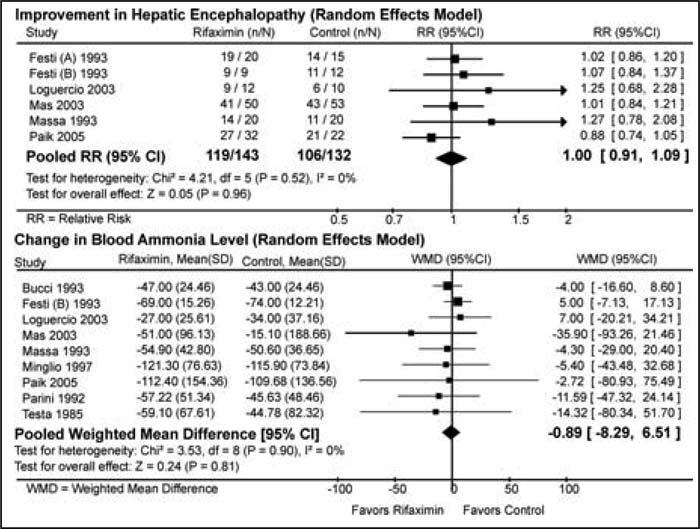Background:
Nonabsorbable disaccharides such as lactulose and poorly absorbed antibiotics such as neomycin and rifaximin are commonly used in the treatment of hepatic encephalopathy (HE). Although several studies have examined the efficacy of rifaximin in patients with HE, results of such trials has been inconsistent. We therefore performed a meta‐analysis of randomized controlled trials to evaluate the efficacy of rifaximin in comparison with other commonly used agents for the treatment of HE.
Methods:
PubMed, EMBASE, and the Cochrane Central Register of Controlled Trials databases were searched from the inception of these databases up to December 2007. Clinical trials that randomized patients with HE to either rifaximin or a control group and reported on either improvement in HE or changes in blood ammonia level were included. References of the retrieved articles were hand‐searched for additional relevant studies. Data on study characteristics, study quality, and outcomes were abstracted independently by 2 investigators, and differences were resolved by consensus. Results were pooled using a random‐effects model.
Results:
We identified 9 trials enrolling 443 patients that fulfilled our inclusion criteria. Most patients were male (64%) and were more than 50 years old. Data on change in blood ammonia level was reported for 208 patients in the rifaximin arm and for 200 patients in the control arm. Treatment with rifaximin was associated with a small and statistically insignificant decrease in blood ammonia level compared with that in the control group (mean difference = ‐0.89 |jg/dL, 95% CI = ‐8.29 to 6.51; P = .90). Data on improvement in HE was reported for 143 patients in the rifaximin arm and for 132 patients in the control arm. HE improved in 119 patients after rifaximin treatment, whereas it improved in 106 patients in the control arm (RR = 1.00, 95% CI = 0.911.09). Thus, treatment with rifaximin did not result in a larger decrease in blood ammonia level or in greater improvement in HE.
Figure 1. Forest plots of meta‐analyses of change in blood ammonia level or improvement in hepatic encephalopathy with rifaximin.
Conclusions:
Rifaximin is not superior to other commonly used pharmacological agents in either decreasing blood ammonia level or improving HE. Factors other than blood ammonia leves or improvement in HE should be considered in the selection of this pharmacological agent.
Author Disclosure:
S. Nepal, none; J. Adomaityte, none; Z. Sid‐diqui, none; M. Amer, none; R. Qayyum, none.

